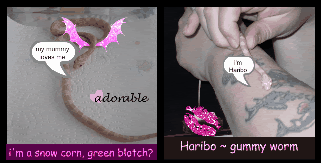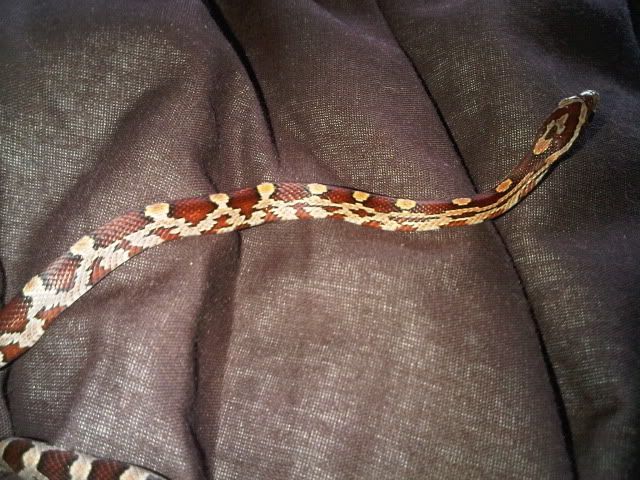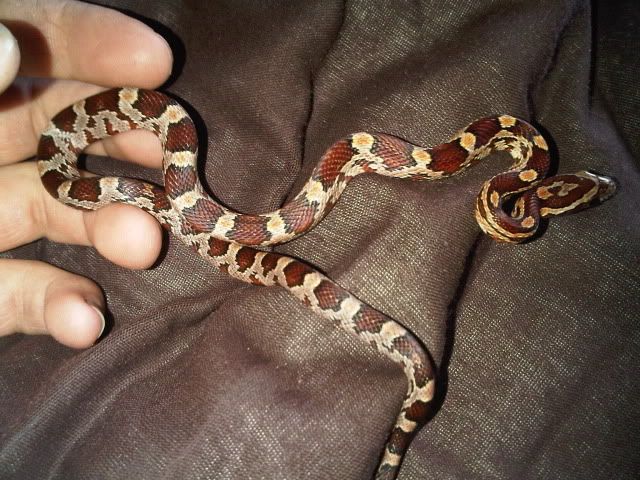| Author |
 Topic Topic  |
|
|
sullysteve
Yearling
  
United Kingdom
507 Posts |
 Posted - 05/06/2010 : 12:52:56 Posted - 05/06/2010 : 12:52:56



|
| Can anyone tell me what morph this is?? |
|
|
n/a
deleted
 
143 Posts |
 Posted - 05/06/2010 : 12:56:32 Posted - 05/06/2010 : 12:56:32


|
| i cant see piccy? |
 |
 |
|
|
sullysteve
Yearling
  
United Kingdom
507 Posts |
|
|
Matt_Brooks
Hatchling
 
138 Posts |
 Posted - 05/06/2010 : 13:07:03 Posted - 05/06/2010 : 13:07:03


|

There you go, looks very much like a Carolina to me, also known as a wild type or common. |
0.1.0 Carolina Corn |
 |
|
|
sullysteve
Yearling
  
United Kingdom
507 Posts |
 Posted - 05/06/2010 : 13:13:46 Posted - 05/06/2010 : 13:13:46



|
The breeder i bought it from has said that he is not sure what kind of morph it is, as it has the orange spots on his back. other than that he is a carolina. ive heard the word "HET" mentioned on other forums etc
Thanks,
Steve |
 |
|
|
Matt_Brooks
Hatchling
 
138 Posts |
 Posted - 05/06/2010 : 13:16:28 Posted - 05/06/2010 : 13:16:28


|

Thats my Carolina. Shes just a plain snake, not Hets or anything and look very similar to yours with the spots :) |
0.1.0 Carolina Corn |
 |
|
|
Matt_Brooks
Hatchling
 
138 Posts |
 Posted - 05/06/2010 : 13:18:29 Posted - 05/06/2010 : 13:18:29


|

Bit of a better one here, spots are noticable but not as much as your snakes :) |
0.1.0 Carolina Corn |
 |
|
|
sullysteve
Yearling
  
United Kingdom
507 Posts |
 Posted - 05/06/2010 : 13:19:42 Posted - 05/06/2010 : 13:19:42



|
COOL! so what is a het?.....i do really think that the normal or common corns are cool (personal opinion) i had the option to get this one or a full on carolina. The carolina was slightly lighter in the browns, where as these two seem to be a little darker, dont you agree?
Steve |
 |
|
|
Matt_Brooks
Hatchling
 
138 Posts |
 Posted - 05/06/2010 : 13:29:08 Posted - 05/06/2010 : 13:29:08


|
Yeh they are darker on the saddles, they tend to get more orangey as they grow older.
HETS are quite hard to explain and wuldnt like to give it a go myself as id probably explain wrong, i know what it is in my head but im terrible at trying to explain it. So for now ive copied this from another website that explains it properly :)
Het is short for heterozygous. In genetics, this means that the snake, or animal has a gene for that particular trait that is not directly expressed (shown) but will if it's bred to either a homozygous (an animal with those traits that is dominant) or another heterozygous animal. For example: a het for albino boa would look like any other boa, but it carries a recessive gene for albinism. If it were bred to an albino (homozygous genetics: two recessive albino genes) or to a normal also het for albino, you'd end up with half, or part of the litter albino. If you bred to an albino, 50% would be albino, the other half normals het for albino. If you bred to a het for albino, 25% would be albino, the rest either normals with no hets or normal het for albino.
Now this is very basic. Hets go very indepth and beond me and i start to find it hard to understand. They're very good for knowing but you only really need to know about genetics when breeding so you know your outcomes and can possitivly ID your offspring.
hope this helps Matt |
0.1.0 Carolina Corn |
 |
|
|
sullysteve
Yearling
  
United Kingdom
507 Posts |
 Posted - 05/06/2010 : 13:47:33 Posted - 05/06/2010 : 13:47:33



|
Nice one matt!, i dont even know the sex yet, so i think i'll leave "het" and all that to the experts. I think for the minute i'll just enjoy having this little creature around!
Steve |
 |
|
|
matty18714
The Count of Corniness
    
United Kingdom
4428 Posts |
 Posted - 05/06/2010 : 13:57:22 Posted - 05/06/2010 : 13:57:22


|
quote:
Originally posted by Matt_Brooks
HETS are quite hard to explain and wuldnt like to give it a go myself as id probably explain wrong, i know what it is in my head but im terrible at trying to explain it. So for now ive copied this from another website that explains it properly :)
Het is short for heterozygous. In genetics, this means that the snake, or animal has a gene for that particular trait that is not directly expressed (shown) but will if it's bred to either a homozygous (an animal with those traits that is dominant) or another heterozygous animal. For example: a het for albino boa would look like any other boa, but it carries a recessive gene for albinism. If it were bred to an albino (homozygous genetics: two recessive albino genes) or to a normal also het for albino, you'd end up with half, or part of the litter albino. If you bred to an albino, 50% would be albino, the other half normals het for albino. If you bred to a het for albino, 25% would be albino, the rest either normals with no hets or normal het for albino.
Now this is very basic. Hets go very indepth and beond me and i start to find it hard to understand. They're very good for knowing but you only really need to know about genetics when breeding so you know your outcomes and can possitivly ID your offspring.
hope this helps Matt
The text you have copied is right, but not right.
"Het" is just short for heterozygous, which means having two differant alleles for a gene.
So you could have one Dominant gene and one Recessive gene on one locus (A Place on DNA). That would still be heterozygous, but the dominant gene would be displayed. Generally with corns, if a snake is het for something, it doesnt show the characteristic because most corn mutations are recessive, but will something like royal ptyhons, alot of visual morphs can be heterozygous. |
  |
 |
|
|
Matt_Brooks
Hatchling
 
138 Posts |
 Posted - 05/06/2010 : 14:10:31 Posted - 05/06/2010 : 14:10:31


|
Thanks for the correction Matty :)
Steve if you want your snaked sexed take it to your local reptile shop. Most will do it for free. Mines very young like yours but i had mine sexed out of curiosity :) |
0.1.0 Carolina Corn |
 |
|
|
Sta~ple
qeeun speler
    
United Kingdom
6129 Posts |
 Posted - 05/06/2010 : 14:52:19 Posted - 05/06/2010 : 14:52:19



|
IT's a beautiful normal :)
Het's won't really matter with normals unless you intrend to bred and then I'm sure you will probably get normals anyway although I'm not 100% sure. |
   
A very special super, duper thanks for K :3 |
 |
|
|
DannyBrown91
Fully Grown Corn
    
United Kingdom
3070 Posts |
 Posted - 05/06/2010 : 15:09:29 Posted - 05/06/2010 : 15:09:29



|
Nice litte snake mate. I would also say he was a normal.
quote:
Originally posted by Sta~ple
IT's a beautiful normal :)
Het's won't really matter with normals unless you intrend to bred and then I'm sure you will probably get normals anyway although I'm not 100% sure.
That depends on wether the hets match. Although you would still get some normals.
Like how you got some normals and some Aneries showing that venom is het Anery. |
0.0.1 Ghost Corn - Casper
0.0.1 Diffused Corn - Reggie
0.0.1 Amel Corn - Candy A.K.A Baby
1.0 Commom BCI - Rocky
0.1 Japanese Akita - Sasha
Location: Liverpool |
 |
|
|
sullysteve
Yearling
  
United Kingdom
507 Posts |
 Posted - 05/06/2010 : 15:20:16 Posted - 05/06/2010 : 15:20:16



|
| whats that bottom bit in english lol?? |
   
1.0 Corns Geoff (Ghost)
0.1 Brazilian Rainbow Boa - Heidi
1.1 Kings - Pete (Florida) + Mamba (Cali Stripe)
1.2 Ball Pythons (Pastel + Bumblebee + Normal)
Location : Warrington, Cheshire |
 |
|
|
mikerichards
don't say the 'M' word!
    
United Kingdom
2901 Posts |
 Posted - 05/06/2010 : 18:49:00 Posted - 05/06/2010 : 18:49:00


|
All he is saying is that a snake proved to be het for anery because he got aneries in the clutch.
With hets, both parents have to carry the Het gene for it to show in the babies.
as mentioned, nearly if not all traits in corns are recessive, so if your snake is het for amelanistic (albino) and you put her to an amel (amelanistic) then you will get normals and amels, and if you put yours to another het, then you will also get normals and amels, but less amels in the clutch because it is watered down more by the normal gene.

Looking at the above, consider A to be normal, and a to be albino
A is dominant to all recessive traits so is in caps,
a is reccessive to all dominant traits so is small.
In the first Fig. the male is normal het for amel so is Aa and the female is het for nothing, she carries nothing other than normal so is AA.
Remember that all animals carry two sets of genes, one from the mother and one from the father.
You can see that if you take one set of genes from each parent and put them together you get AA and Aa, 2 sets of each, so out of 4 snakes you have 2 that are completely normal and 2 that are carrying the albino gene, so they are the hets.
In the second fig. you have two het albino parents Aa and Aa, taking one gene from each you get AA Aa Aa aa, so out of 4 snakes, you have one completely normal, 2 het albinos and 1 albino.
Now the last fig. you have an albino parent aa and a het albino parent Aa, taking one gene from each parent you get Aa Aa aa aa, 2 het albinos and 2 albinos.
Now, just to complicate things a little further, this is where % hets come in.
The first Fig. gives 2 normals and 2 het albinos, so therefor this gives you 50% het albino, because only 50% of the clutch are het albino, but you dont know which ones!
The second one, you have AA Aa Aa aa, so you have 3 normal looking snakes, but 2 are het for albino, so 2/3rds, or they are 66% het albino.
The last is very easy, Aa Aa aa aa, now all the snakes are carrying the albino gene so are predictably 100% hets.
So, if you put an albino snake to a normal snake, you end up passing that albino gene to all babies, along with the normal gene, so all babies are 100% het albino!
Get it???? |
Location : Worthing, West Sussex
|
Edited by - mikerichards on 05/06/2010 19:06:33 |
 |
|
|
mikerichards
don't say the 'M' word!
    
United Kingdom
2901 Posts |
 Posted - 05/06/2010 : 19:05:54 Posted - 05/06/2010 : 19:05:54


|
| that wasnt gonna work!!! |
Location : Worthing, West Sussex
|
Edited by - mikerichards on 05/06/2010 19:07:06 |
 |
|
| |
 Topic Topic  |
|

